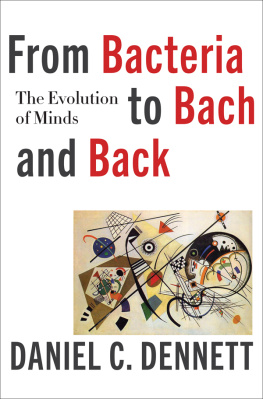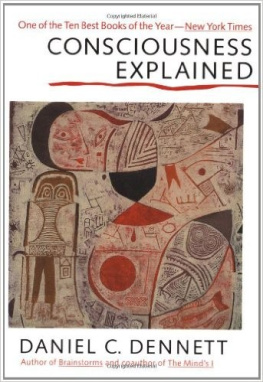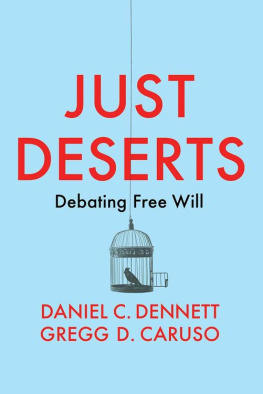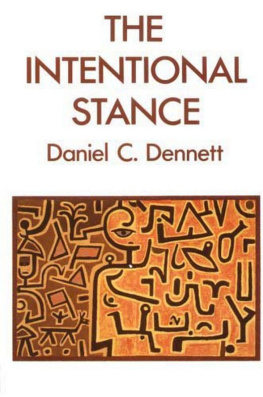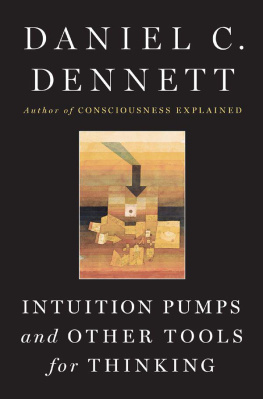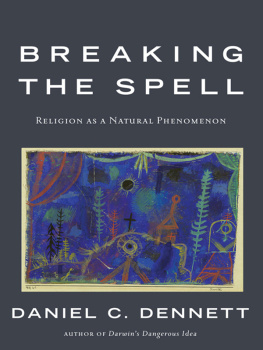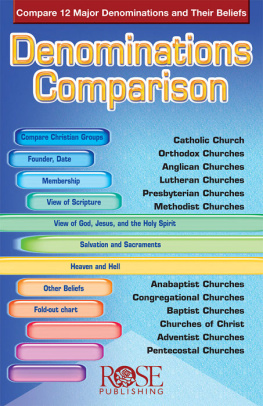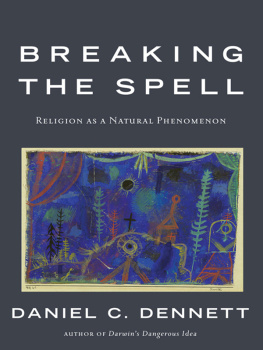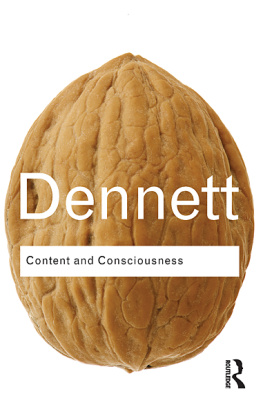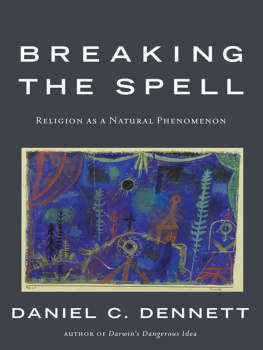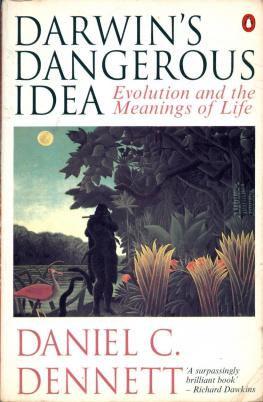Caught in the Pulpit: Leaving Belief Behind
Daniel C. Dennett
and
Linda LaScola
Copyright 2013 by Daniel C. Dennett and Linda LaScola
Photography by Bryce Vickmark / vickmark.com
All rights reserved,
including the right of reproduction
in whole or in part in any form
First Edition
TABLE of CONTENTS
Appendices
Foreword
What must it be like to be frightened of your ownopinions? If asked What do you think about X most of us enjoy the luxury ofreflecting: X, well yes, what do I think? What is the evidence bearing on X?What are the good things about X, what are the bad? Maybe I should read up on Xbefore formulating my opinion. Maybe I should discuss X with friends. X isinteresting, Id like to think about X.
Imagine being in a job which forbids any of that: aprofession to which you have vowed your life with solemn commitments; and wherethe terms of the job are that you must hold certain rigid beliefs about theworld, the universe, morality and the human condition. You are allowed opinionsabout football or chimney pots, but when it comes to the deep questions ofexistence, origins, much of science, everything about ethics, you are told whatto think; or you have to parrot your thoughts from a book, written by unknownauthors in ancient deserts. If your reading, your thinking, your conversations,lead you to change your opinions you can never divulge your secret. If youbreathe a hint of your doubts you will lose your job, your livelihood, therespect of your community, your friends, perhaps even your family. At the sametime, the job demands the highest standards of moral rectitude, so the doublelife you are leading torments you with a wasting sense of shameful hypocrisy.Such is the predicament of those priests, rabbis and pastors who have losttheir faith but remain in post. They exist in surprisingly large numbers, andthey are the subjects of this fascinating, sometimes harrowing, sometimesuplifting book.
Other jobs might make demands on your skills, but if you aredeficient you can do something about it. A lumberjack or a musician can improvewith practice: try harder. But lumberjacks and musicians are not required tobelieve. You cant change your beliefs as an act of will, in the way you candecide to improve your skills with chainsaw or keyboard. If the evidence beforeyour eyes doesnt support a belief, you cannot will yourself to believe itanyway. This, incidentally, is one of the many arguments against PascalsWager: no matter how you rate the odds of immortal salvation, you cant decideto believe in God, as if it were a decision to bet on Red or Manchester United.
It is hard not to feel sympathy for those men and womencaught in the pulpit. It is for this reason that a group of us set up The ClergyProject. I originally even thought of trying to raise money for scholarships retraining clergy as carpenters, say, or secular counsellors. That proved tooexpensive. But we did provide apostate clergy with a website where they cansecretly go to talk to each other, in confidence, protected from parishionersand even from family by pseudonyms and passwords: a safe haven where they canshare experiences, advice, even metaphorical shoulders to cry on. Dan Dennettand Linda LaScola were involved in the Clergy Project from the start: indeed itwas largely inspired by their pilot study, together with the experiences of thepioneer apostate Dan Barker. LaScola and Dennetts pilot study involved fiveProtestant ministers. Four of them are founder members of the Clergy Project.Subsequently the Clergy Project grew and grew, and it now numbers more than500, including Catholics, Protestants, Jews, Muslims and Mormons. The sheernumbers are heart-warming to those of us who see religion as unfavourable tohuman welfare and positively hostile to educational values. But the figuresalso imply a level of human misery on the part of the unfortunate clergythemselves, and the gentle kindness of Dan Dennett and Linda LaScola shinesfrom every page of this book.
Their expanded study looks in detail at thirty individualcases. Some of these men and women believed passionately for many years beforelosing their faith. Others seem to have been already skeptical while still inseminary, but went ahead with their priestly career for reasons that need to beexplored and are. These are human beings, every one different, and thevictims are allowed the space to tell their own stories, woven together withintelligent and insightful commentary by the two authors.
The book is a collaboration between a patient, sympatheticsocial worker and one of the worlds great philosophers. It will surprise as itfascinates. If, as I hope and expect, the 500 apostates now in the ClergyProject turn out to be the thin end of a very large wedge, tip of areassuringly large iceberg, harbingers of a coming and very welcome tippingpoint, this book will be seen as to mix metaphors yet again with pardonableglee the miners canary. It will help us to understand what is happening asthe floodgates open, as I hope they soon will. I also hope it will be widelyread by still-believing clergy, and that it will give them the courage to jointheir colleagues who have already seen the light and walked away from the darkshade of the pulpit.
Richard Dawkins
Oxford, UK
November 2013
I. Introduction
Daniel C. Dennett
1. Preachers Who Arent Believers
This book is about men and women who entered the clergy withthe best of motives and intentions and have come to recognize that they no longerhold the beliefs their parishioners think they do. Half of the people interviewedstill have a congregation awaiting them each Sabbath, trusting them to speak thetruth from the pulpit. They come from various backgrounds and have made differentdecisions about how to deal with their lack of belief in what they think somebodyin their position ought to believe.
The present study, made in collaboration with the clinical socialworker and qualitative researcher Linda LaScola, is a continuation of our 2010 pilotstudy of five male nonbelieving Protestant ministers.Our main objective: to explore, through in-depth interviews, the disconnect betweenwhat closeted nonbelieving clergy believe and what they preach, and the impact ithas on their personal lives, their congregations, and society.
Most people who participated in the present study first learnedabout it through the media attention the pilot study received. This time there werethirty new participants, including women, Catholics, Jews, Mormons, a wider spectrumof liberal (mainline) and literal (fundamentalist) Protestant denominations, a fewcurrent or former theology students, and three mainline Protestant seminary professors.We included the seminary professors to learn how their students react to academicand historical perspectives on the Bible that may be quite different from what theylearned in Sunday school. These professors teach Old and New Testament studies tobeginning seminarians. Their personal religious beliefs were not known in advanceand were not explored in the interviews.To get a better sense of liberal clergy beliefs and thought processes, we includedtwo active, believing, Episcopal clergy. Follow-up interviews with four of the fiveclergy from the pilot study are also included. As with the pilot study, the interviewswere done in confidence, with names and identifying details changed.
The interviewsall of which were conducted by Lindavaried innumber, length, and setting. Though most were conducted face-to-face, somewere done by Skype or phone. Only a few people were interviewed once; most wereinterviewed two or three times over several days, in discussions lasting an hourto an hour and a half. All active clergy were interviewed three times, allowingLinda to follow up on important issues and giving the interviewees time to reflectmore deeply on their experiences and emotions. All in all, 90 interviewswere conducted in more than 120 hours of conversation. (For a complete list andcategorization of the participants
Next page

